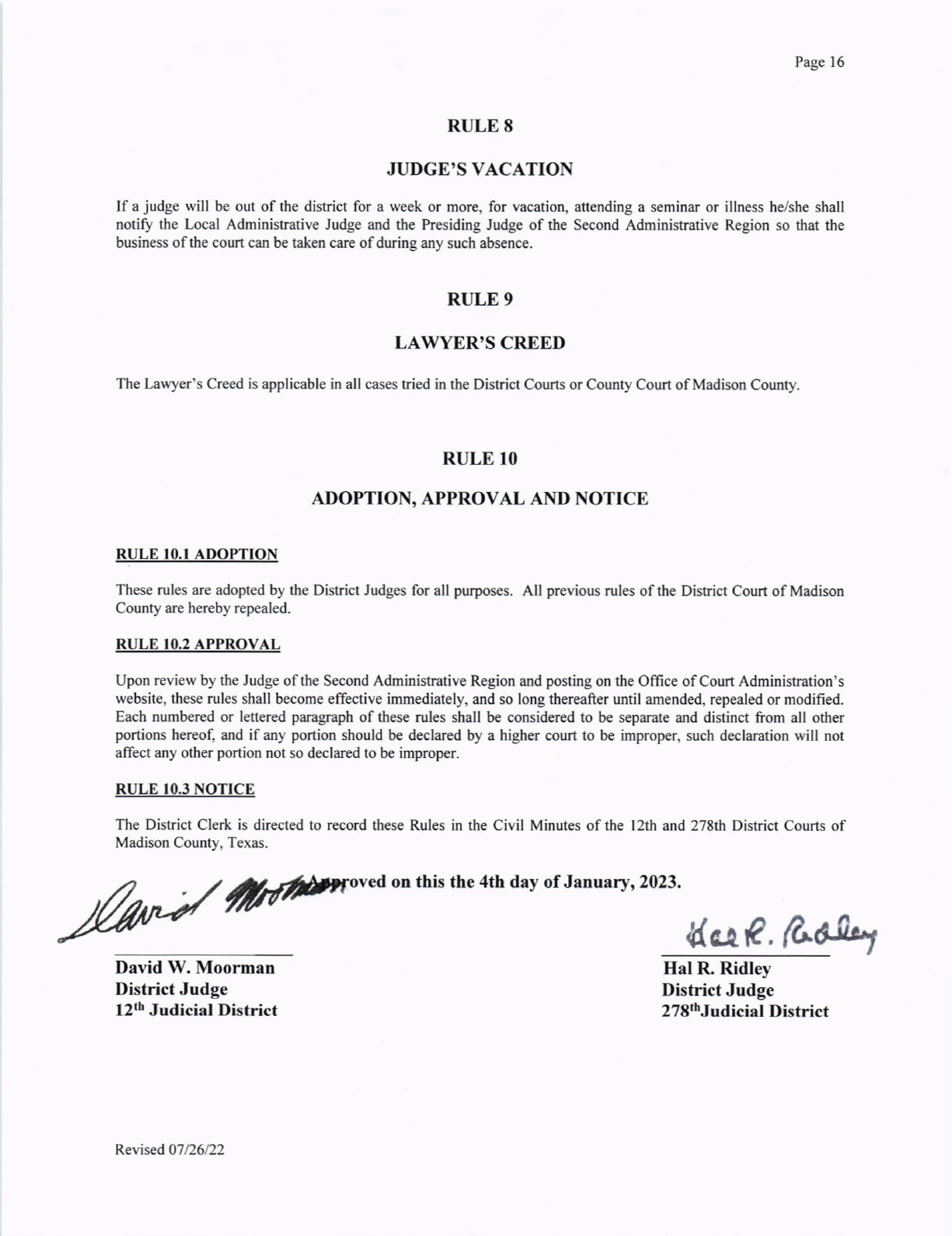LOCAL RULES OF THE DISTRICT COURTS
OF
MADISON COUNTY, TEXAS
12
TH
& 278
TH
JUDICIAL DISTRICTS
Revised 01/10/2023
1

TABLE OF CONTENTS
Rule 1 Application, Jurisdiction and Assignment of Cases …………………………….1
Rule 1.1 Application ……………………………………………………………... 1
Rule 1.2 Jurisdiction ……………………………………………………………... 1
Rule 1.3 Assignment of Cases and Request for Setting ………………………... 1
A. Equal Assignment ……………………………………………………. 1
B. Assignment of Juvenile Cases ………………………………………. 2
Rule 2 Local Administrative Judge, Board of Judges and Rules of Decorum ………. 2
Rule 2.1 Powers and Duties of Local Administrative District Judge …………. 2
Rule 2.2 Board of Judges ………………………………………………………… 2
Rule 2.3 Rules of Decorum ………………………………………………………. 2
Rule 3 Civil Cases ………………………………………………………………………... 2
Rule 3.1 General …………………………………………………………………. 2
Rule 3.2 Transfer of Cases; Docket Exchange; Bench Exchange ……………. 3
A. Transfer ……………………………………………………………… 3
B. Exchange of Cases and Benches ……………………………………. 3
C. Previous Judgment or Filing ……………………………………….. 3
D. Consolidation ………………………………………………………… 3
E. Severance ………………………………………………………………3
F. Presiding for another Judge …………………………………………. 3
G. Removal to District Court …………………………………………… 3
H. Prove-up Divorce Cases and Default Cases ………………………… 3
Rule 3.3 Service of Process ………………………………………………………. 3
Rule 3.4 Requests of the District Clerk …………………………………………. 4
Rule 3.5 Guardians and Attorney Ad Litem …………………………………… 4
Rule 3.6 Docket Settings ………………………………………………………… 4
A. Court Coordinator/Administrator …………………………………. 4
B. Setting Requests ……………………………………………………… 5
C. Docket Control Order ……………………………………………….. 5
D. Calendars …………………………………………………………….. 5
Rule 3.7 Hearings on Pre-Trial Motions and Trial Settings ………………….. 5
A. Pre-Trial Motions (non summary judgment) ……………………… 5
B. Pre-Trial Motions (summary judgment)…………………………… 5
Rule 3.8 Alternate Dispute Resolution and Mediation ………………………... 6
Revised 01/10/2023
2

Rule 3.9 Continuances…………………………………………………………… 6
Rule 3.10 Settlements …………………………………………………………… 6
Rule 3.11 Motions in Limine …………………………………………………… 6
Rule 3.12 Jury Charge, Definitions, Instructions and Questions ……………. 6
Rule 3.13 Voir Dire ……………………………………………………………… 6
Rule 3.14 Dismissal Docket; Involuntary Dismissals …………………………. 7
A. Time Standards for Civil Case Disposition ………………………… 7
B. Dismissal Docket ……………………………………………………... 7
C. Notice …………………………………………………………………. 7
D. Motion to Retain …………………………………………………….. 7
E. Motion for Reinstatement …………………………………………… 7
Rule 4 Family Law Cases ……………………………………………………………….. 8
Rule 4.1 General ………………………………………………………………… 8
Rule 4.2 Time Standards for Family Law Cases ……………………………… 8
Rule 4.3 Juvenile Cases …………………………………………………………. 8
Rule 4.4 Department of Family Protective and Regulatory Services Cases
(Child Protective Services) ……………………………………………… 8
Rule 4.5 Temporary Orders …………………………………………………….. 8
Rule 4.6 Ex Parte Orders ……………………………………………………….. 8
Rule 4.7 Standing Temporary Orders …………………………………………. 9
Rule 4.8 Proposed Property Divisions and Proposed Support Decision …….. 9
Rule 4.9 Parent Education and Counseling …………………………………… 10
Rule 4.10 Discovery ……………………………………………………………… 10
Rule 4.11 Child Support Local Registry ……………………………………….. 10
Rule 5 Criminal Cases …………………………………………………………………... 11
Rule 5.1 Grand Juries and Assignment of Cases ……………………………… 11
A. Grand Juries …………………………………………………………. 11
B. Grand Jury Minute Book …………………………………………… 11
C. Assignment of Cases after Indictment ……………………………… 12
D. New Indictments After Assignment ………………………………… 12
E. Re-Indictments ……………………………………………………….. 12
F. Co-Defendant Indictment ……………………………………………. 12
G. Information to the District Clerk …………………………………… 12
Rule 5.2 Bonds ……………………………………………………………………. 12
Rule 5.3 Bond Surrender ………………………………………………………… 12
Rule 5.4 Bond Forfeiture ………………………………………………………… 13
Rule 5.5 Post Conviction Proceedings …………………………………………... 13
Rule 5.6 Arraignment ……………………………………………………………. 13
Rule 5.7 Scheduling Order ………………………………………………………. 13
Rule 5.8 Standing Discovery Order ……………………………………………... 13
Revised 01/10/2023
3

Rule 5.9 Pretrial Hearing ……………………………………………………….. 13
Rule 5.10 Docket Call ……………………………………………………………. 13
Rule 5.11 Motions for Continuance …………………………………………….. 13
Rule 5.12 Plea Bargains …………………………………………………………. 14
Rule 5.13 Standing Order in Limine …………………………………………… 14
Rule 5.14 Voir Dire ………………………………………………………………. 14
Rule 5.15 Time Standards ……………………………………………………….. 14
Rule 5.16 Fair Defense Act ………………………………………………………. 14
Rule 6 Conflicting Engagements of Attorneys ………………………………………… 14
Rule 7 Attorney Vacations ………………………………………………………………. 15
Rule 8 Judge’s Vacation …………………………………………………………………. 16
Rule 9 Lawyer’s Creed …………………………………………………………………... 16
Rule 10 Adoption, Approval and Notice ………………………………………………... 16-19
Revised 01/10/2023
4

Local Rules of the District Courts of Madison County
PURPOSE
The Local Rules of the District Courts of Madison County have as their
primary purpose the management of the court dockets in a fair, just,
equitable and impartial manner. These rules are designed to be an aid in
achieving that goal and to do so in a timely and economical manner.
RULE 1
APPLICATION, JURISDICTION AND ASSIGNMENT OF CASES
RULE 1.1 APPLICATION
These rules apply to all cases, civil, criminal, and family, of which the District Courts have exclusive jurisdiction in
Madison County.
RULE 1.2 JURISDICTION
Exclusive jurisdiction of District Courts encompasses matters defined by the constitution, statute or case law as the
sole province of District Courts.
RULE 1.3 ASSIGNMENT OF CASES
A. The District Clerk shall assign cases equally among the District Courts on a mandatory rotation basis unless
specifically instructed otherwise by these rules or by the Board of Judges.
B. Assignment of Juvenile Cases
The District Clerk shall assign all Juvenile cases to the County Court.
RULE 2
LOCAL ADMINISTRATIVE DISTRICT JUDGE, BOARD OF JUDGES AND RULES
OF DECORUM
RULE 2.1 POWERS AND DUTIES OF LOCAL ADMINISTRATIVE DISTRICT JUDGE
A. Election of the Administrative Judge
Revised 01/10/2023
5

Page 2
Revised 07/26/22
Pursuant to Section 74.091 of the Texas Government Code, a majority of the District Judges will elect a Local
Administrative District Judge for a one-year term at the December meeting of each year to commence on January
1st of the following year.
B. Duties
The Local Administrative District Judge will have the duties and responsibilities provided in Rule 9 of the Rules of
Judicial Administration, the Regional Administrative Rules and these rules.
RULE 2.2 BOARD OF JUDGES
The Board of Judges shall consist of the Judges of the District Courts. The board shall meet to discuss and resolve
questions that are of common concern to all of the members thereof. The Local Administrative District Judge or any
member of the Board of Judges may call meetings of the board as needed. The Local Administrative District Judge
shall preside over such meetings; and in his/her absence, a temporary Chairperson may be elected by a majority of
the quorum.
RULE 2.3 RULES OF DECORUM
The Judges have a duty to maintain order and proper decorum in the courtroom. The Board of Judges have adopted
the Rules of Decorum set forth and posted on the Court’s website, these rules which shall apply to all attorneys and
others appearing in the courtrooms of Madison County. The rules may be enforced by contempt or referral to the
State Bar of Texas for grievance proceedings, or both, as the judge deems proper.
RULE 3
CIVIL CASES
RULE 3.1 GENERAL
All civil cases which the District Courts of Madison County have exclusive jurisdiction shall be efiled with the
District Clerk's office. Even numbers shall be assigned to cases filed in the 12
th
District Court and odd numbers
shall be assigned to cases filed in the 278
th
District Court.
RULE 3.2 TRANSFER OF CASES; DOCKET EXCHANGE; BENCH EXCHANGE
A. Transfer
After assignment to a particular court, a case may be transferred to another court by order of the judge of the court in
which the case is pending with the consent of the judge of the court to which it is transferred.
B. Exchange of Cases
The courts may at any time exchange cases and benches to accommodate their dockets or to expedite the court's
trials, as permitted by law.
C. Previous Judgment or filing
Any claim for relief based upon a previous judgment shall be assigned to the court of original judgment. If a case is
filed in which there is a substantial identity of parties and causes of action in a previously non-suited case, the later
Revised 01/10/2023
6

Page 3
Revised 07/26/22
case shall be assigned to the court where the prior case was pending.
D. Consolidation
A motion to consolidate cases shall be heard in the court where the lowest numbered case is pending. If the motion
is granted, the consolidated case will be given the number of the lowest numbered case and assigned to that court.
E. Severance
If a severance is granted, the new case will be assigned to the court where the original case is pending; however, a
new file date and a new cause number will be assigned to the now severed case.
F. Presiding for another Judge
In all cases where a judge presides for another court, the case shall remain pending in the original court.
G. Removal to District Court
A case that has been assigned to a County Court in error, because the subject matter is within the exclusive
jurisdiction of the District Courts, will be returned to the District Clerk for reassignment.
H. Prove-up Divorce Cases and Default Cases
Uncontested divorce cases, default judgments, or other uncontested matters, may be heard by either of the District
Judges or the Judge of the County Court, if the judge assigned the case is unavailable, subject to the requirements of
jurisdiction.
RULE 3.3 SERVICE OF PROCESS
Process—including citation and other notices, writs, orders, and other papers issued by the court—may be served
anywhere by (1) any sheriff or constable or other person authorized by law, (2) any person authorized by law or by
written order of the court who is not less than eighteen years of age, or (3) any person certified under order of the
Supreme Court.
RULE 3.4 DISTRICT CLERK
A. Telephone Requests
The court clerk shall limit response to telephone requests for information to the following:
If answer has been filed.
Existence of case on file.
Return of service and date.
Correct style of case when correct case number is supplied.
If an order has been signed.
Whether or not a jury fee has been paid and date of payment.
Whether or not a specific document has been filed. But this does not authorize a fishing expedition.
B. Pro Se
Revised 01/10/2023
7

Page 4
Revised 07/26/22
All pro se
parties upon filing any petition or responsive pleading should provide an email address for service via
efile, as well as address and current phone number. Any party unable to provide such information above must file a
pleading requesting an exception to this rule.
RULE 3.5 GUARDIANS AND ATTORNEYS AD LITEM
When it is necessary for the court to appoint a guardian ad litem for minor or incompetent parties or an attorney ad
litem for absent parties, independent counsel, not suggested by any of the parties or their counsel, will be appointed.
However, the court may appoint an attorney who is already counsel of record for one of the parties if the court finds
that no conflict of interest or other circumstances exist which would prevent such attorney from providing adequate
representation for such minor, incompetent or absent defendant.
RULE 3.6 DOCKET SETTINGS
A. Court
Coordinator/Administrator
Each court shall appoint a court coordinator/administrator. It shall be the duty of each court
coordinator/administrator to:
Provide the court, the clerk assigned to that particular court and the general public with a printed docket of
the cases set for a hearing for each day of court;
Post the docket on the webpage of the Court on the Court’s county website;
No
tify all counsel of settings and rulings of the court as is provided by these rules or at the direction of the
court;
Prepare scheduling orders for cases assigned to their court;
Coordinate all setting requests; and
Coordinate with the juror coordinator of the District Clerk's office concerning jury trials and jury
requirements.
B. Setting
Requests
Requests for hearings and trials in the District Courts shall be made in writing to the court in which the matter is
pending, and the attorneys making such request shall serve all counsel and parties appearing pro se with notice of
the setting request. The setting request shall be in the form set forth on the Court’s county webpage. If the setting
request is approved, the court coordinator will confirm the setting in writing.
C. Docket Control Orders
Each court may generate docket control orders for each civil case pending. Upon approval of a docket control order
the parties shall submit a setting request to the Court Coordinator for any trial setting.
D. Calendars
Court Calendars are established by the 12
th
and 278
th
Judicial District Courts for each calendar year that set forth the
availability of the respective courts for trials or other hearings in the counties of Walker, Grimes, Madison and Leon.
Copies of these calendars may be obtained from the District Clerk or Court Coordinator.
Revised 01/10/2023
8

Page 5
Revised 07/26/22
.RU
LE 3.7 Pre-Trial Motions
A. Pre-Trial Motions (Non Summary Judgment)
Form
Motions and responses shall be in writing and shall be acco
mpanied by a proposed order granting or denying the
relief sought. The proposed order shall be a separate instrument.
Response
Responses shall be in writing. Responses shall be filed before th
e hearing date. Failure to file a response may be
considered a representation of no opposition. A reply may be filed at any time after a response is filed prior to the
court’s ruling.
Certificate of Conference
Opposed motions and responses shall contain a Certificate of Conference indicating that the counsel involved have
atte
mpted to resolve the dispute prior to filing of the motion or response, the date of such attempt and the manner of
communication of such an attempt, or any other requirement of the court.
B. Pre-Trial Motions (Summary Judgment Rule 166(c) TRCP)
Motion
The motion shall state the specific grounds
thereof in numerical order and shall state the specific facts relied upon in
each ground, identify the source of those facts, and specify where in the summary judgment evidence the facts are
found. The motion shall contain a clear and concise argument for each ground with appropriate citations to
authorities relied upon and specific references to the summary judgment evidence.
Response
The response shall address the motion in the same numerical order established in the motion for summary judgment.
The
response shall state the specific facts relied upon, identify the source of those facts, and specify where in the
summary judgment evidence the facts are found. The response shall set out a clear and concise argument with
appropriate citations to authorities relied upon and specific references to the summary judgment evidence.
RULE 3.8 ALTERNATE DISPUTE RESOLUTION AND MEDIATION
A.
Alternate Dispute Resolution
In order to encourage the early settlement of disputes and to carry out the responsibilities of the courts as set out in
Chapter 154 of the Texas Civil Practices and Remedies Code, appropriate alternative dispute resolution procedures
will be encouraged and utilized.
B. Mediation
The courts encourage mediation in order to facilitate the settlement of disputes and litigation. Each court shall adopt
a procedure for the use of mediation in all civil cases. It is in the sound discretion of the trial court whom to use as a
mediator and the procedures for same.
RULE 3.9 CONTINUANCES
Any motion for continuance of the trial setting shall be presented to the court pursuant to the Texas Rules of Civil
Revised 01/10/2023
9

Page 6
Revised 07/26/22
Procedure. The proposed order granting or denying such motion shall contain a provision for resetting the case for
trial on a specific date and time.
RULE 3.10 SETTLEMENTS
All trial counsel are required to make a bona fide effort to settle cases at the earliest possible date before trial. The
court will expect counsel to confer with his/her client and with opposing counsel concerning settlement offers. When
an attorney settles or dismisses a case that is set for trial, he shall give notice to the court as soon as possible.
RULE 3.11 MOTIONS IN LIMINE
The Standing Order in Limine, on the Court’s webpage, shall apply to all civil cases tried in the District Courts of
Madison County and should counsel desire that additional matters be included a motion will be required.
RULE 3.12 JURY CHARGE, DEFINITIONS, INSTRUCTIONS AND QUESTIONS
Each party shall prepare in proper written form and present to the court prior to trial or the jury selection all jury
charge definitions, instructions and questions which are expected to be raised by the pleadings and evidence and
upon which the party has an affirmative burden. The charge shall be provided in both written form and via email,
flash drive or other electronic form specified by the court.
RULE 3.13 VOIR DIRE
The District Clerk shall align the Juror Information Cards in numerical order and seat the panel in numerical order.
The judge will qualify the panel and accept or reject any excuses. After the final panel is determined, the attorneys
must make their decision on whether or not a shuffle will be requested. The court will recess the panel to give the
clerk time to copy the jury cards and to make a new list of names of jurors, either in shuffled order or in numerical
order. When the new list is completed and cards copied the clerk will re-seat the jury according to the list and voir
dire will begin. The attorneys and judge will be furnished a copy of the list and jury information cards.
Challenges for cause will be made after all parties have completed their voir dire examination of the panel. After all
counsel have completed their voir dire examination, the attorneys will be asked to approach the bench. Counsel will
be asked in turn for the juror number of the jurors whom they wish to challenge for cause. If, in the opinion of the
court, sufficient evidence has been adduced to support a ruling, the challenge will be granted or denied without
further questions. Otherwise, the panel member will be called to the bench and each counsel will be allowed a few
questions. The panel member will then be excused to return to their seat, and the challenge will be ruled on outside
the presence of the panel member.
If any panel member responds to questions during voir dire examination in a manner which makes it clear that they
possess such strong opinions that a challenge for a cause will clearly be good, and there exists a possibility that
further responses may “poison” the entire panel, counsel should diplomatically terminate the inquiry and avoid
further inquiries in the presence of the panel. If adverse counsel has a good-faith belief that the panel member can
be rehabilitated, it will be pursued on an individual basis after the general voir dire examination.
Counsel will be allowed to tell the panel what their contentions are in order to provide a context for their voir dire
examination. Detailed recitations of facts should be reserved for opening statement.
If panel members ask counsel about the existence of insurance or any other specific factual matter, counsel should
direct the question to the Court.
RULE 3.14 DISMISSAL DOCKET; INVOLUNTARY DISMISSALS
Revised 01/10/2023
10

Page 7
Revised 07/26/22
A. Time Standards for Civil Case Dispositions
A. Civil Jury Cases
All civil jury cases shall be tried or dismissed within 18 months from appearance date.
B.
C
ivil Non Jury Cases
All civil non-jury cases shall be tried or dismissed within 12 months from appearance day.
B. Dismissa
l Dockets
All cases not brought to trial or otherwise disposed of which have been on file for more than the specified time
period as established by these rules shall be placed on the dismissal docket by the Court.
C. Notice
When a case has been placed on the dismissal docket, the court shall promptly send notice of the court's intention to
dismiss for want of prosecution to each attorney of record and pro se party whose address is shown in the clerk's file.
A copy of such notice shall be filed with the papers of the cause.
D. M
otion to Retain
Unless a written motion to retain has been filed prior to the dismissal date as set forth in the notice of intention to
dismiss, such case shall be dismissed. Notice of the signing of the order of dismissal shall be given as required by
Rule 165a of the Texas Rules of Civil Procedure. Failure to mail notices as set out above shall not affect any of the
periods mentioned in Rule 306 (a) of the Texas Rules of Civil Procedure except as provided in that rule.
E.
Motion for Reinstatement
A motion for reinstatement after dismissal shall follow the procedure and be governed by the provisions of Rule
165a of the Texas Rules of Civil Procedure relating to reinstatement.
RULE 4
FAMILY LAW CASES
RULE 4.1 GENERAL
The filing, assignment, and transfer of cases under the Family Code shall be in accordance with Rule 1 of these
rules. All cases filed pursuant to the Family Code, shall be governed by Rule 3 and 4 of these rules.
RULE 4.2 TIME STANDARDS FOR FAMILY LAW CASE DISPOSITION
Cases shall be tried or dismissed within 6 months from the appearance date or within 6 months from the expiration
of the waiting period provided by the Family Code where such is required, whichever is later. Cases not concluded
within these time periods will be placed on the Dismissal For Want of Prosecution Docket.
RULE 4.3 JUVENILE CASES
The J
uvenile Board of Madison County has designated the County Court as the Juvenile Court of Madison County.
Revised 01/10/2023
11

Page 8
Revised 07/26/22
Rules for the disposition of juvenile cases will be adopted by the Juvenile Court in conformity with Rule 1 of the
Second Administrative Judicial Region of Texas Regional Rules of Administration and Title 3 of the Texas Family
Code. These cases shall be filed in the District Clerk’s office pursuant to rules established by the Juvenile Judge and
District Clerk, copies of these rules may be obtained from the Juvenile Judge.
RULE 4.4 DEPARTMENT OF FAMILY AND PROTECTIVE SERVICES CASES (Child Protective
Services)
Disposition of Texas Department of Family and Protective Services (CPS) cases shall be in conformity with those
provisions set forth in Title 5 of the Texas Family Code. These cases shall be filed in the District Court, but shall be
heard by the 2
nd
Region Child Protection court unless referred to the 12
th
or 278
th
District Court.
RULE 4.5 ATTORNEY GENERAL CASES
Disposition of Attorney General Cases shall be in conformity with the Texas Family Code, but will be heard by the
A.G. Associate Judge appointed by Second Judicial Region Presiding Judge.
RULE 4.6 TEMPORARY ORDERS
A. Except in emergencies when the District Clerk’s office is not open for business, no application for immediate or
temporary relief shall be presented to a judge until it has been filed and assigned to a court. If the judge of the court
to which such case is assigned is absent or is occupied with other matters, the coordinator of the assigned court shall
insert a date and hour for hearing in any form of a proposed order before such application may be presented to any
other judge, who may sit for the judge of the court in which the case is pending and shall make all writs and process
returnable to the assigned court.
B. Whenever immediate action of a judge is required in an emergency when the clerk’s office is not open for
business, the case shall at the earliest practicable time be docketed and assigned to a court, and all writs and process
shall be returnable to the assigned court. If the judge of such court is not available to hear the application for
temporary relief at the time set, any court with jurisdiction may preside in this case.
RULE 47 EX PARTE ORDERS
A. All applications for ex parte relief shall be presented to the court to which the case is assigned, unless emergency
circumstances exist and then shall be presented in accordance with Paragraph 4.5.B.
B. In any case in which counsel of record for the nonmoving party has been designated, said application shall be
presented to said counsel, by efile, email, fax, hand delivery, or other method of service designed to give opposing
counsel immediate notification, in addition to the requirements of Rule 21a TRCP.
RULE 4.8 STANDING TEMPORARY RESTRAINING ORDERS
A. The court hereby ORDERS that in all divorce suits filed, a Standing Temporary Restraining Order in the form as
posted to the Court’s webpage is imposed on all parties to the suit. All petitions for divorce shall contain a
statement signed by the Petitioner evidencing receipt of a copy of the Standing Temporary Restraining Order, and in
the absence of such paragraph, it shall be DEEMED that Petitioner, by invoking the court’s jurisdiction, has
constructive notice of the Standing Temporary Restraining Order and subjects himself or herself to it.
B. The clerk of this court shall attach, to each citation to be served, a copy of the Standing Temporary Restraining
Order. Said Standing Temporary Restraining Order shall become effective on the Respondent when citation is
served, a waiver of citation is signed, or actual notice in some other manner is received.
C. The Standing Restraining Order remains effective until the temporary hearing, if any, or if a temporary hearing
Revised 01/10/2023
12

Page 9
Revised 07/26/22
is not requested by either party, until the final hearing. Should a temporary hearing be requested by either party,
then the court shall determine whether the Standing Temporary Order shall remain in effect until the final hearing
and absent a ruling of the court to the contrary, the Standing Restraining Order shall remain effective until the final
hearing.
RULE 4.9 PROPOSED PROPERTY DIVISIONS AND PROPOSED SUPPORT DECISIONS
A. Filing
Proposed Property Division Statements shall be filed in all domestic relations cases related to divorce. Proposed
Support Decision Statements shall be filed in all cases involving modification of conservatorship, support or
periods of possession. These proposals shall be furnished in the format as posted on the Court’s webpage.
B. Temporary Orders
In any hearing for temporary orders in which child support or spousal support is an issue, completion and exchange
of Proposed Support Decision Statements is required prior to commencement of the hearing in the form as posted
to the Court’s webpage.
C. Trial
A party's final Proposed Support Decision Statements regarding child support and a Proposed Property Division
Statement shall be exchanged no later than ten (10) days before trial, or as required by the docket control order, and
filed with the court before the commencement of trial. This proposed division of assets and liabilities and the
proposed findings regarding support shall be furnished in the format set as posted to the Court’s webpage.
D. Failure to file Proposed Property Division and Proposed Support Decision Statements.
Failure of either party to file Proposed Property Division and Support Division Statements may result in the court
adopting as stipulated the information filed by the complying party. The non-complying party will be prohibited
from contesting the accuracy of the information presented by the complying party. If both parties fail to comply with
these rules, the court may dismiss the case from the docket.
RULE 4.10 PARENT EDUCATION AND COUNSELING
Referral may be made in suits affecting the parent-child relationship requiring the parents' attendance at an
educational program for divorcing parents. In the discretion of the court, such a referral may also be made for
parents involved in modification or enforcement litigation. Counseling may also be ordered in appropriate cases as
authorized by the Family Code, including referral to a family violence program pursuant to a protective order under
Chapter 71 of the Family Code.
RULE 4.11 DISCOVERY
Pursuant to Texas Rules of Civil Procedure 194.2(c) Content in Certain Suits Under the Family Code:
(1) In a suit for divorce or annulment, a party must, without awaiting a discovery request, provide to the other party
a copy of:
(A) all documents pertaining to real estate;
(B) all documents pertaining to any pension, retirement, profit-sharing, or other employee benefit plan,
including the most recent account statement for any plan;
(C) all documents pertaining to any life, casualty, liability, and health insurance; and
(D) the most recent statement pertaining to any account at a financial institution,
including banks, savings
and loans institutions, credit unions, and brokerage firms.
Revised 01/10/2023
13

Page 10
Revised 07/26/22
(2) In a suit in which child or spousal support is at issue, a party must, without awaiting a discovery request, provide
to the other party a copy of:
(A) all policies, statements, and the summary description of benefits for any medical and health insurance
coverage that is or would be available for the child or the spouse;
(B) the party’s income tax returns for the previous two years or, if no return has been filed, the party’s
Form W-2, Form 1099, and Schedule K-1 for such years; and
(C) the party’s two most recent payroll check stubs.
Failure to exchange these items may result in sanctions being imposed on the attorney, or party, or both, as
the court deems proper.
4.12 Child Support Disbursement Unit
All child support payments will be made to State Disbursement Unit.
Revised 01/10/2023
14

Page 11
Revised 07/26/22
RULE 5
CRIMINAL CASES
RULE 5.1 GRAND JURIES AND ASSIGNMENT OF CASES
A. Gr
and Juri
es
The 12
th
Judicial District Court shall select and impanel the Grand Jury for the January term of court and the 278
th
Judicial District Court shall select and impanel the Grand Jury for the July term of court. The grand juries shall hold
all of their meetings in the Madison County Courthouse, in the room designated by the impaneling judge. The
Grand Jury shall be impaneled in accordance with Articale19A of the Code of Criminal Procedure.
B. Grand Jury Minute Book
The rules regarding presentment of indictments by a Grand Jury to the District Court are set forth in Articles 20.21
and 20.22 of the Code of Criminal Procedure. Article 20.21 requires that the Foreperson of the Grand Jury shall
deliver the indictments to the Judge or District Clerk and that at least nine members of the grand jury must be
present when the delivery is made. Article 20.22 requires that the fact of presentment be entered upon the minutes
of the court. The “minutes of the court” are contained in the Grand Jury Minute Book. The Grand Jury Minute
Book shall remain in the custody of the District Clerk at all times except when the Grand Jury is in session. The
Grand Jury Minute Book is not a secret book or document.
When the grand jury begins a session, the District Clerk shall have all members present sign the Grand Jury Minute
Book as proof of their presence at the session and to make a record of the fact that a quorum was present at the
session. The District Clerk shall then deliver the book to the Secretary of the Grand Jury. When a true bill of
indictment is voted in the affirmative by at least nine members of the Grand Jury, the following information shall be
entered by the Secretary of the Grand Jury in the Grand Jury Minute Book, and nothing else, to wit:
1. the
date of the session;
2.
nam
e of the person indicted;
3.
offense;
and
4.
nam
es of the witnesses upon which the indictment is founded.
If the defendant is not in custody or under bond at the time of the presentment of the indictment, upon request of the
District Attorney, the entry of the name of the defendant in the book may be delayed until such time as the capias is
served and the defendant is placed in custody or under bond, at which time the name of the defendant will be entered
in the book by the District Clerk. It is the duty of the District Clerk to verify that the indictments delivered to the
clerk conform with the information contained in the Grand Jury Minute Book. If there is a variance, it should be
called to the attention of the Secretary, Foreperson and District Attorney immediately.
When a defendant is “no-billed”, meaning that a case was presented to the grand jury regarding an individual and
less than nine affirmative votes were given for a true bill of indictment, a Certificate of No-Bill shall be signed by
the Foreperson certifying that the case was presented to the Grand Jury and that a no-bill was returned. The District
Clerk shall handle the certificates as follows:
A.
Defendant Under Arrest: If the defendant is under arrest, a copy of the certificate shall be
delivered to the Sheriff and the defendant immediately.
B. Defendant Under Bond: A copy of the certificate shall be delivered to the
surety (bondsman) and the defendant immed
iately.
Revised 01/10/2023
15

Page 12
Revised 07/26/22
C. All other certificates shall be held by the clerk under seal, unless ordered released by the
district court.
C. Assignment of Cases After Indictment
Except as otherwise provided in this Rule, the clerk shall equally distribute every criminal case filed by indictment
into the two district courts. Even numbered cases shall be assigned to the 12
th
District Court and odd numbered
cases shall be assigned to the 278
th
District Court.
Capital cases shall be assigned on an independent, rotational basis among the district courts.
D. New Indictments After Assignment
After assignment, the clerk shall assign any new indictment against a defendant to the same court.
E. Re-indictments
The clerk shall assign any re-indictment of the same defendant to the same court in which the prior indictment was
assigned.
F. Co-Defendant Indictment
The clerk, after random assignment of an indictment to a court shall assign any co-defendant subsequently indicted
to the same court in which the first co-defendant's indictment was assigned.
G. Information to the District Clerk
The District Attorney shall note on a non-substantive part of the indictment the following information:
Whether there are other pending indicted cases on the defendant;
Whether the indictment is a re-indictment and;
The names of any co-defendants not named in the indictment.
The District Attorney shall also furnish the clerk information in writing as to whether or not a non-standard
bond will be sought by the State and the factors supporting same.
RULE 5.2 BOND
Bonds will be set on each criminal case in accordance with Chapter 17 of the Code of Criminal Procedure. The
court may also, in a proper case, dispense with the requirement of sureties and require only the personal
recognizance of the defendant, with or without conditions.
RULE 5.3 BOND SURRENDER
Sureties requesting a release on their liability on a Bail Bond must complete the Affidavit to Release Surety and
present the completed affidavit to the District Judge that the Defendants case is assigned to. The form and
requirements for release are posted to the Court’s webpage.
RULE 5.4 BOND FORFEITURE
Bonds will be forfeited on all defendants who do not appear in court when scheduled or otherwise ordered to appear
in court. The name of the defendant will be called three times at the courtroom door by the Bailiff and if there is no
Revised 01/10/2023
16

Page 13
Revised 07/26/22
answer the bond will be forfeited and a capias issued by the clerk for his arrest. It is the duty of the District Clerk to
prepare a Judgment Nisi with the aid of the District Attorney. The Judgment Nisi proceedings will be docketed as a
civil matter in the court that ordered the forfeiture and the defendant and his sureties shall be served with citation.
After the surety files an answer or defaults, the District Clerk shall notify the proper court coordinator for a trial
setting to be docketed. The sureties shall be given forty-five days advance notice of any trial setting.
RULE 5.5 POST CONVICTION PROCEEDINGS
The clerk shall file any motion to revoke probation or any post-conviction application for writ of habeas corpus in
the court having granted probation or entered the judgment in the case.
RULE 5.6 ARRAIGNMENT
Defendants shall be arraigned at the earliest possible time after indictment. Presence of the defendant is mandatory
at arraignment unless excused by the court or counsel for defendant has filed a written waiver of arraignment prior
to the date of the arraignment. At arraignment a scheduling order shall be entered setting discovery deadlines, dates
of pretrial hearing, docket call and trial date.
RULE 5.7 SCHEDULING ORDER
Each court will adopt a scheduling order that shall be delivered to the defendant and counsel at arraignment. The
defendant and his counsel and counsel for the state shall sign the scheduling order.
RULE 5.8 STANDING DISCOVERY ORDER
The State of Texas is hereby ordered to furnish discovery to the defendant as provided in Article 39.14 of the Code
of Criminal Procedure. Said discovery shall be furnished no later than seven (7) days prior to the pretrial hearing as
set forth herein. Counsel for defendant shall register for the e-discovery portal with the Madison County District
Attorney’s office for discovery and accept discovery in that format.
RULE 5.9 PRETRIAL HEARING
The pretrial hearing shall be held within sixty (60) days from date of arraignment. All matters preliminary to actual
trial on the merits must be brought to the attention of the court at this hearing.
RULE 5.10 DOCKET CALL
The court coordinator shall prepare a list of all cases on the trial docket. The defendant and his counsel shall be
present and announce ready or not ready. An announcement of “not ready” must be accompanied by a motion for
continuance.
RULE 5.11 MOTIONS FOR CONTINUANCE
All motions for continuance, whether filed by the State or the defendant, must comply with the applicable law
contained in the Code of Criminal Procedure and must be presented to and considered by the court in accordance
with the scheduling order. Except for good cause shown and upon compliance with these rules, the court shall not
consider any motion for continuance on the scheduled trial date.
RULE 5.13 STANDING ORDER IN LIMINE
Revised 01/10/2023
17

Page 14
Revised 07/26/22
The Standing Order in Limine, posted to the Court’s webpage, shall apply in all felony jury trials in the District
Courts of Madison County.
RULE 5.14 VOIR DIRE
The District Clerk shall align the Juror Information Cards in numerical order and seat the panel in numerical order.
The Judge will qualify the panel and accept or reject any excuses. After the final panel is determined, the attorneys
must make their decision on whether or not a shuffle is requested. The court will recess the panel to give the clerk
time to copy the jury cards and to make a new list of names of jurors, either in shuffled order or in numerical order.
When the new list is completed and cards copied the clerk will re-seat the jury according to the list and voir dire will
begin. The attorneys and judge will be furnished a copy of the list and jury information cards.
Challenges for cause will be made after all parties have completed their voir dire examination of the panel. After all
counsel has completed their voir dire examination, the attorneys will be asked to approach the bench. Counsel will
be asked in turn for the Juror Number of the jurors whom they wish to challenge for cause. If, in the opinion of the
court, sufficient evidence has been adduced to support a ruling, the challenge will be granted or denied without
further questions. Otherwise, the panel member will be called to the bench and each counsel will be allowed a few
questions. The panel member will then be excused to return to their seat, and the challenge will be ruled on outside
the presence of the panel member.
If any panel member responds to questions during voir dire examination in a manner which makes it clear that they
possess such strong opinions that a challenge for a cause will clearly be good, and there exists a possibility that
further responses may “poison” the entire panel, counsel should diplomatically terminate the inquiry and avoid
further inquiries in the presence of the panel. If adverse counsel has a good-faith belief that the panel member can
be rehabilitated, it will be pursued on an individual basis after the general voir dire examination.
RULE 5.15 TIME STANDARDS
Criminal cases shall be completed within 12 months from earliest date of arrest or indictment.
RULE 5.16 FAIR DEFENSE ACT
The rules adopted by Madison County concerning the Fair Defense Act may be obtained from the Local
Administrative Judge.
RULE 6
CONFLICTING ENGAGEMENTS OF ATTORNEYS
A. Attorney already in trial in another court.
When informed that an attorney is presently in trial, the court will determine where and when assigned. This
information will be verified upon request of opposing counsel. The case will be placed on “hold” or reset,
depending upon when the attorney will be released. If the attorney is not actually in trial as represented by the
attorney or his agent, the case will be tried without further notice.
B. Attorney assigned to two courts for the same date:
It is the duty of every attorney to call the affected Judge’s attention to all dual settings as soon as they are known.
Insofar as is practicable, judges should attempt to agree on which case has priority, otherwise the following priorities
shall be observed by the Judges of the respective courts:
Revised 01/10/2023
18
Page 15
Revised 07/26/22
Criminal cases
Cases given preference by statute
Preferentially set cases
Case set at earliest date
Case with earliest filing date
Cases in Metropolitan areas should yield to courts in rural areas
If the conflict cannot be resolved between the two judges, the Local Administrative Judge or the Regional Presiding
Judge will resolve the conflict.
C. Designation of Attorney in Charge
Every case shall have an attorney in charge designated.
RULE 7
ATTORNEY VACATIONS
A. DESIGNATION OF VACATION
Subject to the provisions of subparts B and C of this rule, an attorney may designate not more than four weeks of
vacation during a calendar year as vacation, during which that attorney will not be assigned to trial or required to
engage in any pretrial proceedings. This rule operates only where lead counsel, as defined by T.R.C.P., is affected,
unless the trial court expands coverage to other counsel.
B. SUMMER VACATIONS
Written designation for vacation weeks during June, July, or August must be filed with the District Clerk by May
15. Summer vacations so designated will protect the attorney from trials during those summer weeks, even if an
order setting the case for trial was signed before the designation was filed.
C. NON-SUMMER VACATIONS
Written designations for vacations in months other than June, July, or August must be filed with the district clerk by
February 1. Non-summer vacation weeks may not run consecutively for more than two weeks at a time. Non-
summer vacation weeks so designated will not protect an attorney from a trial by an order signed before the date the
designation is filed.
(Source Rule 11 Second Region)
Revised 01/10/2023
19

Page 16
RULE
8
JUDGE'S VACATION
If a
judge
will
be out of the district for a week
or more, for vacation, attending a seminar or illness he/she
shall
notiry the Local Administrative
Judge and the Presiding Judge of the Second Administrative
Region so that the
business ofthe court can be taken care ofduring any
such absence.
RULE 9
LAWYER'S CREED
The Lawyer's Creed is applicable in all
cases tried in the District Courts or County Court
of
Madison
County
RULE
IO
ADOPTION,
APPROVAL AND NOTICE
RULE
IO.I ADOPTION
These rules are adopted
by the District Judges for all purposes.
All
previous
rules of the District Court of Madison
County are hereby repealed.
RULE
TO.2 APPLOVAL
Upon review by the Judge ofthe
Second
Administrative
Region and
posting
on the Office ofCourt Administration's
website, these rules
shall become effective immediately, and so long thereafter until
amended, repealed or modified.
Each
numbered
or lettered
paragraph
of these rules
shall be considered to be separate and distinct from
all other
portions
hereof, and if any
portion
should be declared by a higher coun to be impropel
such declaration
will
not
affect any other
portion
not so declared to
be improper.
The
District
Clerk is directed to record these Rules
in the Civil Minutes of the l2th and 278th District
Courts of
Madison County, Texas.
ed on this the 4th day of January, 2023.
y'ildfrT
*
David W. Moorman
District Judge
l2th Judicial District
d,u€,
(L
Hal R. Ridley
District
Judge
2TSthJudicial District
Revised, 07
/26/22
RULE
I
O.3 NOTICE
Revised 01/10/2023
20

RULES OF DECORUM
RULE 1: OPENING PROCEDURE
Immediately before the scheduled time for the first court session on each day, the bailiff shall direct all persons present
to their seats and shall cause the courtroom to come to order. As the Judge enters the courtroom, the bailiff shall state:
“Everyone rise, please.”
And while everyone is still standing, the bailiff shall announce:
“The _____________ District Court of Madison County, Texas is now in session,
Judge _______________________________ presiding. Be seated, please.”
RULE 2: RECESS
When the Judge announces a recess, the bailiff shall state:
“Everyone rise, please.”
And all shall remain standing until the judge leaves the courtroom, whereupon the bailiff shall announce:
“This Court is recessed until _______________ (a certain time.)”
In reconvening after a recess, the bailiff shall call the courtroom to order and request everyone to rise as the judge
enters, and shall then state:
“Be seated, please.”
Before a recess of a jury trial, the jury will be excused, and all other persons present shall rise while the bailiff conducts
the jury from the courtroom into the jury room.
After a recess, the bailiff shall direct all jurors to the jury room and shall call the courtroom to order and request
everyone to rise as the Judge enters, as in non-jury trials. After everyone is reseated, the jury shall be returned to the
jury box from the jury room and everyone except the judge will rise again until the jury is seated.
RULE 3: GENERAL RULES OF COURTROOM CONDUCT
All officers of the court except the judge, and jurors, and all other participants except witnesses, who have been placed
under the rule, shall promptly enter the courtroom before the scheduled time for each court session. When the bailiff
calls the court to order, complete order should be observed.
In the courtrooms, there shall be:
No tobacco used.
No chewing gum used.
No reading of newspaper or magazines.
No bottles, cups or beverage containers except court water pitchers and cups.
No edibles.
No propping of feet on tables or chairs.
12/30/2022
1

No noise or talking that interferes with court proceedings.
The judge, the attorneys, and other officers of the court will refer to and address other court officers or participants in
the proceedings respectfully and impersonally, as by using appropriate titles and surnames rather than first names.
The form of address toward the judge shall be (“Judge,” or “Your Honor”).
The oath will be administered in a manner calculated to impress the witness with the importance and solemnity of the
promise to adhere to the truth.
All officers of the court shall dress appropriately for court sessions.
RULE 4: CONDUCT OF ATTORNEYS
Attorneys should observe the letter and spirit of all canons of ethics, including those dealing with discussion of cases
with representatives of the media and those concerning improper ex parte communications with the Judge.
Attorneys should advise their clients and witnesses of local Rules of Decorum that may be applicable to them.
All objections, arguments, and other comments by counsel shall be directed to the Judge, or jury and not to opposing
counsel.
While another attorney is addressing the judge, or jury, an attorney should not stand for any purpose except to claim
the right to interrupt the attorney who is speaking.
Attorneys should not approach the bench without leave of court and must never lean on the bench.
Attorneys shall remain seated at the counsel tables at all times except:
a) When the judge enters or leaves; and
b) When addressing the judge, or jury; and whenever it may be proper to handle documents,
exhibits, or other evidence. (Leave of court is not required)
Attorneys should anticipate any need to move furniture, appliances, or easels, and should make advance arrangements
with the bailiff. Tables should not be moved without leave of court.
Only attorneys and parties are permitted to sit at the counsel tables. All secretaries, paralegals, investigators and other
personnel must remain outside the bar unless granted specific leave of court to enter.
12/30/2022
2
12/30/2022
3
